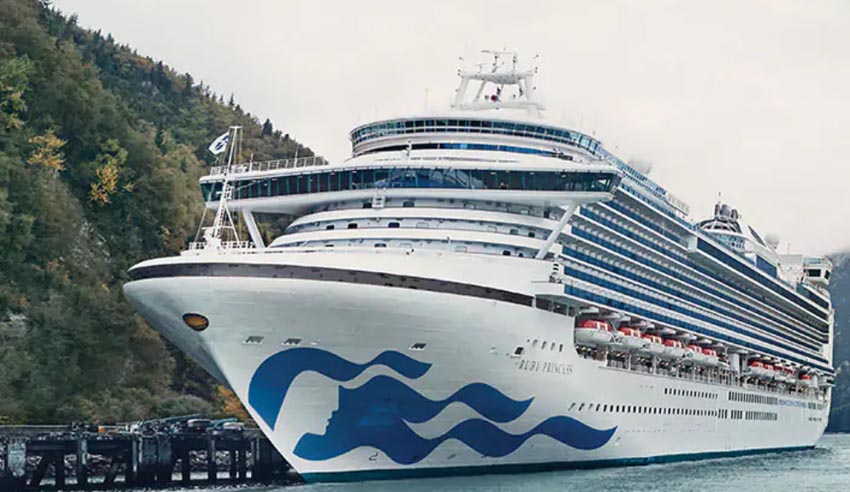The global cruise ship industry has sailed into a storm as a result of the COVID-19 crisis raising a multitude of legal issues, writes Donald Rothwell FAAL.

The first inkling of the troubles ahead arose with the Diamond Princess which while on an East Asian cruise was denied access to several ports before arriving in Yokohama on 3 February. Once there, Japanese authorities were confronted with dealing with outbreaks of COVID-19 among passengers and crew, hospitalisation of those who were ill, and eventual repatriation of passengers to their home countries. Similar incidents have now been replayed with cruise ships in ports from Sydney, to Fremantle, to Uruguay, and Florida.
The other unique dynamic that has arisen is that whilst the closure of ports and harbours is not exceptional, especially during severe weather or wars, the pandemic has seen the near-simultaneous closure of ports and harbours at the same time meaning that in a number of instances cruise ships had nowhere to dock. The Panama Canal was even closed to two ships – the MS Rotterdam and MS Zaandam – in late March. Only after negotiations with the Holland America Line were the ships allowed to pass through the canal and make their way to ports in Florida.
The operation of cruise ships raises a unique mix of public and private international law in ways that are not dissimilar to the international aviation industry. Cruise ships, like all shipping, enjoy the freedom of navigation under the law of the sea. This gives these ships rights to sail the high seas and also in and around certain coastal areas, including the territorial sea where a right of innocent passage can be exercised. This is irrespective of whether the ships are flagged to the coastal state around whose waters they are sailing, or to a registry state elsewhere. In this respect, the global cruise industry is no different to the shipping industry more generally and flags of convenience are commonplace. Many cruise ships are therefore flagged to registries in the Bahamas, Bermuda, Italy, Malta, or Panama and nominally that is where their “home” ports are located. This is notwithstanding that the ships may be chartered, owned, and operated by cruise operators that are located elsewhere such as the US.
A “foreign-flagged” cruise ship that is flying one of these flags is entitled to enter an Australian port as part of its regularly scheduled services. This entitlement also extends to when the ship is carrying passengers and crew who may be ill. Given the length of time that cruise ships are at sea, and the general age and health of their passengers, ill-health is not uncommon and doctors and medical facilities are available to deal with common health issues.
However a pandemic such as COVID-19 clearly raises many additional challenges, and the World Health Organisation (WHO) 2005 regulations anticipate some of the issues that arise. The WHO regulations require port states to have in place appropriate medical facilities to receive ships carrying passengers impacted by disease and to provide assistance to those ships, including land-based medical facilities such as hospitals. Importantly, entry to ships carrying passengers impacted by a pandemic is not to be denied. Nevertheless, authorities in both NSW and Western Australia raised concerns over local health facilities being overwhelmed by COVID-19 cases from cruise ships coming into port. This has highlighted whether the medical systems in those states had the capacity to receive these ships in the manner anticipated by the WHO regulations.
An important aspect associated with the entry of any foreign ship into a port is the principle of pratique, which is relevantly defined in the WHO regulations as “permission for a ship to enter a port, embark or disembark, discharge or load cargo or stores”. Pratique is also reflected in Australian law under the Biosecurity Act 2015 (Cth) and is supported by Maritime Arrivals Reporting Systems (MARS), which place obligations upon ships prior to entry to provide details of any biosecurity threats.
The manner in which pratique was granted on 19 March to the cruise ship Ruby Princess to enter Sydney Harbour and disembark passengers, many of whom were subsequently found to have been infected with COVID-19, is under review. Three investigations have been commenced: a NSW criminal investigation, a NSW coronial inquiry as a result of the deaths of several of those passengers, and a NSW government Special Commission of Inquiry by Bret Walker SC into the process and practices that were followed.
Resolving some of the issues associated with pratique and in the case of Australia the respective roles of the Department of Agriculture, Australian Border Force, the relevant state health departments, and the local port authorities are critical to moving forward in responding to the pandemic in Australian ports.
While one impact of COVID-19 is that the global cruise industry will more than likely be suspended until such time as states reopen their borders and the cruise operators can satisfy passengers of their health and safety, merchant ships will continue to operate. As states seek to energise their economies through the resumption of trade and commerce shipping will play a vital role. The granting of pratique will assume increased importance as states attempt to balance the economic importance of trade against the need to stop the spread of COVID-19.
Donald Rothwell FAAL is a Professor of International Law at ANU College of Law